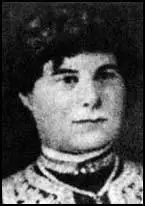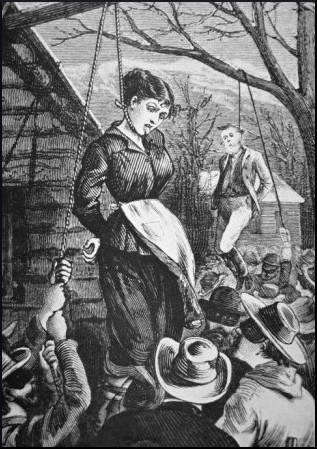Ellen Watson

Ellen Watson, the daughter of Thomas Lewis Watson and Francis Close, was born in Bruce County, Ontario, in July 1860. In 1877, her family, including her nine bothers and sisters, moved to Lebanon, Kansas.
As a young woman she moved to Wyoming where she established a homestead near Independence Rock. She became close friends with James Averell, a neighbouring farmer. Watson helped Averell in the saloon. A local newspaper, the Cheyenne Mail Leader, described her as "of a robust physique, a dark devil in the saddle, handy with a six-shooter and a Winchester, and an expert with a branding iron."
In 1889 Watson and Averell got involved in a dispute with Albert J. Bothwell, a powerful cattleman in Wyoming. Both their homesteads were on land claimed by Bothwell for grazing his cattle. Averell wrote to the local papers criticizing Bothwell. He retaliated by claiming that Averell and Watson were stealing his cattle. Watson was also accused of being a prostitute who sometimes accepted stolen cattle in payment.
On 20th July, 1889, six men, Albert Bothwell, Tom Sun, Ernest McLean, Robert Connor, Robert Galbraith and John Durbin, arrived at the homes of Ellen Watson and James Averell, and told them they intended to arrest them for rustling. According to Keith Taylor: "Although Ellen’s young wards tried to help her, they were kicked out of the way and Ellen herself was shoved into a buggy. The ranchers took her by force to Jim Averell’s place.... the kids ran for help, and found it in the shape of Jim’s nephew and a cowboy friend, Frank Buchanan. The pair grabbed six-shooters and rode to the rescue."

Averell's foreman, Frank Buchanan, followed the party and observed them stopping at the mouth of a small canyon by Sweetwater River. When it was clear that the men intended to lynch Watson and Averell, Buchanan opened fire on Bothwell and his men. Outnumbered, Buchanan was eventually forced to flee from the scene.
Bothwell and the five other men were charged with the murders of Watson and Averell. Frank Buchanan, the key witness to the crime, disappeared and was presumed murdered. Another witness also died in mysterious circumstances. Therefore Albert J. Bothwell and his fellow defendants were acquitted.
Primary Sources
(1) Keith Taylor, Ruthless Cattle Barons and Little Farmers (2012)
Although Ellen’s young wards tried to help her, they were kicked out of the way and Ellen herself was shoved into a buggy. The ranchers took her by force to Jim Averell’s place. They accused him of being her rustler accomplice and said they had an arrest warrant on him. He demanded to see it. They shoved a rifle under his nose and answered, “That’s our warrant.” Meanwhile the kids ran for help, and found it in the shape of Jim’s nephew and a cowboy friend, Frank Buchanan. The pair grabbed six-shooters and rode to the rescue.
Unfortunately, it wasn’t a movie and there was no fade-out to a happy ending. Jim and Ellen had already been hung from a pine tree. Buchanan and the nephew opened fire with their pistols, but they couldn’t halt the lynching or get near enough to help, and rifle fire forced them to retreat. None of the lynching party was ever arrested. The Cheyenne papers … well, they dubbed Ellen Liddy Watson “Cattle Kate” and made her out to be a former whore. The story was accepted and believed. Neither Ellen’s survivors nor her family could do a thing against the vested interests. Frank Buchanan, like other witnesses and people who knew Ellen’s real character, was intimidated, killed or bought off. Bothwell lived happily ever after. Unless, as some stories relate, he went off his head and died raving mad.
